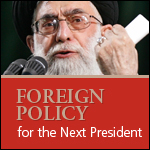Iran continues to be a critical national security challenge for the United States, despite decades of effort to change Tehran’s behavior by isolating the country politically and economically. A different approach is required. In a new policy brief, Karim Sadjadpour explains that the relevant question is not whether to talk to Iran but how to talk to Iran, and prioritizes U.S. engagement with Iran on six critical issues: Iraq, Afghanistan, nuclear proliferation, the Arab–Israeli conflict, energy, and terrorism.
- Focus initially on areas where the United States and Iran share common interests, such as Iraq and Afghanistan, rather than issues with little or no common interest, like the nuclear issue or the Israeli–Palestinian conflict.
- Refrain from any grand overtures to Tehran which risk redeeming Iranian President Ahmadinejad’s policies and enhancing his bid for reelection in June of 2009.
- Deal with those who hold power in Iran, namely Supreme Leader Ayatollah Ali Khamenei.
- Avoid rhetoric that threatens violence. This only empowers Tehran’s hard-liners and paints the United States as the aggressor.
- Maintain a multilateral approach. Tehran is highly adept at exploiting rifts in the international community.
- Resist attempts by spoilers within Iran to torpedo a diplomatic breakthrough.
- Pursue “secret” or “private” discussions—proven to have a greater success rate.
- Support policies that facilitate, rather than impede, Iran’s modernization and reintegration in the global economy.
About the Author
Karim Sadjadpour, a leading researcher on Iran, joined Carnegie as an associate after four years as the chief Iran analyst at the International Crisis Group based in Tehran and Washington, D.C. Sadjadpour has conducted dozens of interviews with senior Iranian officials, and hundreds with Iranian intellectuals, clerics, dissidents, paramilitaries, businessmen, students, activists, and youth, among others.





